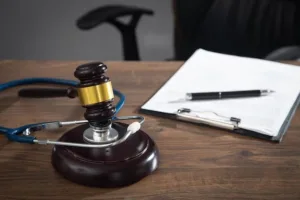Choosing the right personal injury attorney can significantly affect the outcome of your case. Whether you’ve been injured in a car accident, slip and fall, or workplace incident, selecting an attorney with the right experience, credentials, and reputation is essential. The right attorney can guide you through complex legal procedures, advocate on your behalf, and help ensure you receive fair compensation for your injuries, lost wages, and other damages.
This guide will walk you through the key factors to consider when hiring a personal injury attorney, including attorney credentials, past experience, client reviews, and useful consultation tips. We’ll also explain what you should expect from the attorney-client relationship, how to prepare for your initial meeting, and ways to evaluate whether an attorney is the best fit for your specific case.
Understanding the Role of a Personal Injury Attorney
A personal injury attorney specializes in representing clients who have suffered injuries due to someone else’s negligence. Their primary role is to:
- Assess your case and determine its legal viability
- Communicate with insurance companies and negotiate settlements
- Represent you in court if necessary
- Ensure that you receive fair compensation for medical expenses, lost wages, and pain and suffering
Understanding the attorney’s role helps you evaluate potential candidates effectively. It also allows you to set realistic expectations about the timeline and potential outcomes of your case. Knowing what a personal injury attorney can do helps you feel more confident and prepared when making decisions about your legal representation.
Key Factors to Consider When Choosing a Personal Injury Attorney
Choosing the right attorney involves evaluating multiple factors. The following elements are essential:
1. Attorney Credentials
Check the attorney’s credentials to ensure they are licensed and in good standing with the state bar. Credentials may also include board certifications or memberships in professional organizations, which can reflect specialization in personal injury law.
A qualified personal injury attorney should also stay updated on changes in Florida’s personal injury laws to ensure the most effective representation.
2. Experience
Experience is crucial in personal injury cases. Attorneys who have handled cases similar to yours are more likely to understand the legal nuances and negotiate favorable settlements.
- Look for attorneys with years of trial experience in Florida courts
- Check if they have successfully handled claims like car accidents, medical malpractice, or slip and fall injuries
- Consider their familiarity with insurance companies, as this can streamline settlement negotiations
An attorney with substantial experience can anticipate potential challenges and develop strategies tailored to your specific situation. Their past case history often provides insight into how they approach complex legal matters and advocate for clients effectively.
3. Client Reviews and Reputation
Reviews from past clients provide insight into how an attorney works, communicates, and resolves cases. Consider:
- Online reviews on Google or legal directories
- Testimonials provided on the attorney’s website
- Awards or recognitions in the legal community
Positive client feedback often indicates a reliable personal injury attorney with a strong track record. Additionally, consistently satisfied clients can reflect the attorney’s professionalism, responsiveness, and ability to handle complex cases effectively. Evaluating reviews helps you gauge whether the attorney will meet your expectations throughout the legal process.
4. Consultation Tips
Most personal injury attorneys offer a free initial consultation. Preparing for this meeting is crucial:
- Bring all relevant documents such as medical records, accident reports, and insurance information
- Prepare a list of questions about the attorney’s experience, fees, and strategy
- Evaluate communication style and responsiveness during the consultation
- Discuss potential timelines and outcomes for your case
Effective consultations help you assess whether the attorney is a good fit for your needs. They also give you an opportunity to understand the attorney’s approach, level of attention to detail, and how comfortable you feel working with them. Being well-prepared ensures you make an informed decision about your legal representation.
Questions to Ask a Personal Injury Attorney
During the consultation, asking the right questions can clarify your attorney’s abilities and approach. Consider asking:
- How many personal injury cases have you handled in Florida?
- What is your success rate for cases similar to mine?
- Will you handle my case personally or assign it to staff?
- How are your fees structured?
- What strategy would you recommend for my case?
A well-prepared consultation ensures that you understand what to expect and can make an informed decision.
Evaluating Attorney Fees
Most personal injury attorneys work on a contingency fee basis, meaning they only get paid if you win your case. It is essential to:
- Understand the percentage charged as a contingency fee
- Ask about additional costs for court filings, expert witnesses, or administrative expenses
- Ensure that fee agreements are in writing
Understanding fees in advance prevents surprises and helps you select an attorney who aligns with your financial situation.
How to Prepare for Your Personal Injury Case
Proper preparation helps your attorney build a stronger case. Consider:
- Keeping detailed records of all medical treatment and expenses
- Documenting lost wages and other financial losses
- Maintaining communication logs with insurance companies
- Collecting witness statements if applicable
Your attorney can guide you on what documentation is most important. Additionally, being organized and thorough with your records allows your attorney to present a clear and compelling case, anticipate challenges, and respond effectively to any disputes. Careful preparation can significantly improve the likelihood of a favorable outcome.
Key Considerations When Choosing a Personal Injury Attorney
When evaluating an attorney, consider these critical points:
- Credentials – Verify licensing, certifications, and professional memberships
- Experience – Confirm trial experience and history with similar cases
- Client Reviews – Check testimonials and online reputation
- Consultation Preparedness – Assess questions, communication style, and responsiveness
- Fees – Understand contingency fees and potential additional costs
Using these factors as a checklist helps ensure you select an attorney suited to your case’s needs.
Conclusion
Choosing the right personal injury attorney requires careful evaluation of attorney credentials, experience, and client feedback. Preparing for consultations and understanding fees helps ensure a smooth process. With the right attorney, you can maximize compensation while navigating the complexities of personal injury law.
Additionally, understanding how an attorney approaches your case, communicates with clients, and handles negotiations can help you feel more confident throughout the legal process. Taking the time to research and compare potential attorneys ensures that your case is in capable hands and that your interests are effectively represented.
Get expert guidance with Accident Medical Group on your personal injury case. Connect with their experienced team to understand your rights and explore your legal options.
Frequently Asked Questions
What does a personal injury attorney do?
A personal injury attorney represents clients injured due to negligence, negotiating settlements and advocating in court if necessary.
How do I know if an attorney is qualified?
Check credentials, years of experience, and client reviews. A reputable attorney should be licensed and have a track record of similar cases.
What should I bring to the initial consultation?
Bring all relevant medical records, accident reports, insurance correspondence, and a list of questions about the attorney’s strategy and fees.
How are attorney fees structured?
Most personal injury attorneys work on a contingency fee basis, taking a percentage of the settlement only if you win.
Can a personal injury attorney help with insurance claims?
Yes. They can handle communications with insurance companies, negotiate settlements, and ensure your legal rights are protected.





